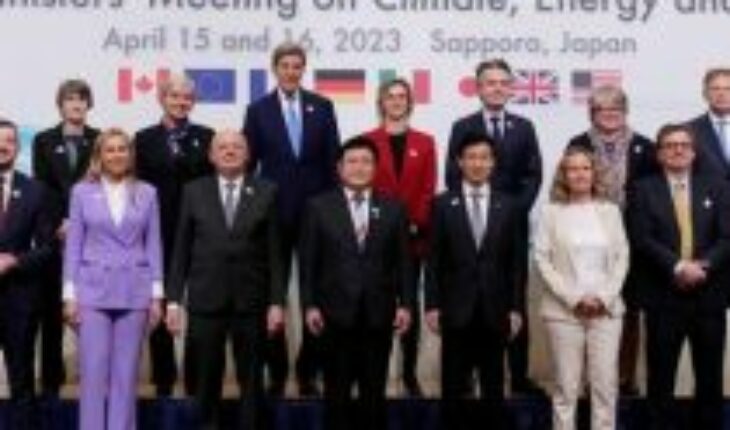The G7 Energy and Environment Ministers, meeting in the Japanese city of Sapporo, set themselves on Sunday the goal of reducing CO₂ emissions from all their vehicles by at least 50% by 2035 (compared to 2000 levels).
G7 ministers, at the preparatory meetings for the May 19-21 summit in Hiroshima, also pledged to move away from fossil fuels faster and urged other countries to do the same, but did not agree on any new deadline for ending polluting energy sources such as coal.
Although the language employed in the final declaration reflects the depth of disagreements in the group of most industrialised nations, with host Japan leading a pushback against the more ambitious proposals discussed, French Energy Transition Minister Agnes Pannier-Runacher said the “phase-out” wording was nevertheless a “strong step forward” ahead of September’s G20 summits in New Delhi and COP28 taking place in September. end of the year in Dubai.
Automotive industry
Reducing vehicle emissions is part of the global goal of achieving net-zero emissions from the motor sector by 2050, which will require key industry actions in all countries, including measures already implemented by G7 members to achieve 100% of new passenger car sales are zero-emission models by 2035.
To achieve this, they commit to cooperate in work to develop electric vehicle production infrastructure, as well as charging systems, in addition to supporting emission-neutral fuels, according to the joint statement.
Other measures mentioned are efforts to “harmonize methods that guarantee the supply of materials for batteries”, and to support the recycling of these energy storage devices.
Criticisms of Lemke
German Environment Minister Steffi Lemke told a news conference after the signing of the document that “it is no secret that different G7 countries have different opinions regarding nuclear energy.”
The German government, which yesterday shut down its last nuclear power plants, criticized in Sapporo the group’s commitment to achieve “each at his own pace” a society free of fossil fuels, which includes dependence on nuclear energy.
The document signed today by the countries of the group says that “countries that choose to use nuclear energy recognize its potential to provide affordable low-carbon energy that can reduce dependence on fossil fuels, to address the climate crisis and ensure global energy security.” The text highlights that these countries would commit to “maximize the use of current reactors safely and efficiently and to the advancement of safe operation in the long term”, with Japan, the host of the meeting, being the country that has most advocated this point.
Another point of disagreement is the discharge into the sea of contaminated and treated water that accumulates at the Fukushima nuclear power plant.
“We have deep respect for the efforts of the Japanese government, but we cannot welcome the dumping of these waters,” Lemke said.
The text signed today also refers to this spill and ensures that it will be carried out “in accordance with safety standards and international law without causing harm to human beings and the environment.”
Follow us on





